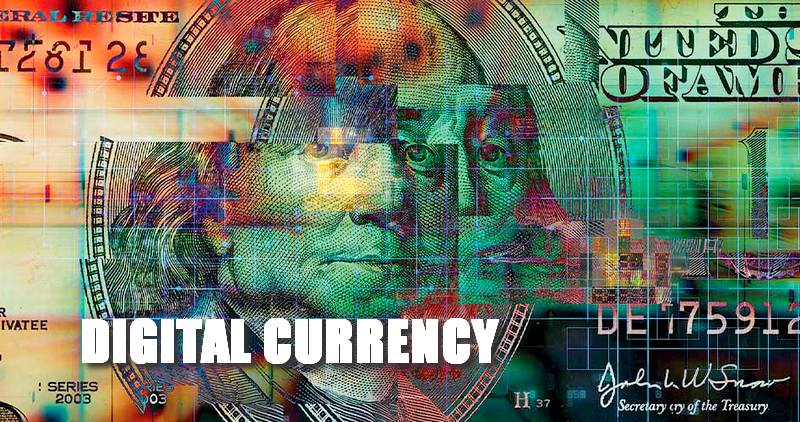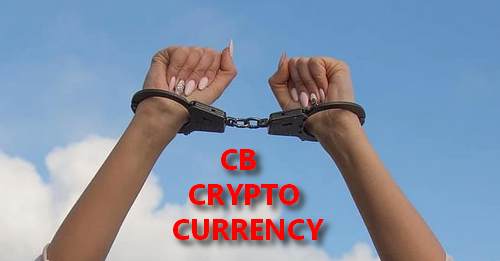The Shackles of Central Bank Digital Currency

By New American - Rebecca Terrell - 28 May 2023
Central bank digital currency is the latest craze among government elites. If it’s not resisted, this programmable money could signal the demise of financial freedom.
You won’t be able to buy anything without permission from the government. Every dollar you earn, spend, or save will be monitored by autocrats who, with the click of a button, can turn off your earning, spending, or saving potential at any time. You’ll be forced to buy food, clothing, shelter — and everything else you need or want — according to tyrannical dictate. Or you will be prevented from purchasing by the same oligarchs, who control not only what you buy, but when and from whom you buy it.

This might seem like dystopian science fiction. But thanks to central bank digital currency (CBDC), it is unfortunately already a reality in some countries.
China has been using its own CBDC, the digital yuan, since April 2021 to help impose the surveillance and control of financial transactions that is already common practice in that country.
There, the government ranks its subjects using a social credit score, which labels a person as a good or bad citizen. Living in China, you earn high scores for things such as paying off debt, praising government initiatives on social media, and observing speed limits. High scores translate into perks for public services.
On the other hand, criticizing the government, purchasing alcohol or cigarettes, or even jaywalking will ding your score. The lower the score, the fewer the privileges. People’s personal smartphones and electronic payment histories enable this type of tracking, as does a system of facial-recognition cameras littered throughout metropolitan areas. Known as Skynet, they eerily bear the name of the genocidal artificial intelligence system cast as the villain in the Terminator movies.
The Chinese government uses slightly different tactics from those of the fictitious character. Individuals it deems “untrustworthy” may see their names, faces, and even home addresses plastered on public marquees as condemnation for their bad behavior. And the worst of the bunch earn an unenviable position on the Chinese Supreme Court’s blacklist.
The French public broadcast service France 24 profiled blacklisted journalist Liu Hu, who “got a little too close to uncovering corruption among high-profile” Communist Party members. One of them sued for defamation, and Hu found himself blacklisted. Deemed “untrustworthy,” he was banned from traveling and could no longer obtain a bank loan, start a business, rent an apartment, or send his children to private school.
This type of totalitarian control will increase with the proliferation of the digital yuan, which is slated to replace all paper money and coins with currency controlled directly by the Communist Party’s central bank. Of course, social credit scores will be linked to digital bank accounts.
“There will be a point where the People’s Bank of China is going to be able to look, peer inside of every single transaction that everyone does, 24 hours a day, 7 days a week,” Erik Bethel, former U.S. executive director of the World Bank, told CBN News.
“The Chinese government … with the proverbial flip of a switch, can make people fall in line by cutting off their access to money,” added former CIA analyst Yaya Fanusie.
Can’t Happen Here?
Think it can’t happen here? Last November the Federal Reserve Bank of New York, together with global banking giants Citigroup, Inc.; HSBC Holdings Plc; Mastercard, Inc.; and Wells Fargo & Co. announced their “regulated liability network,” a 12-week pilot program, ostensibly to “test how banks using digital dollar tokens in a common database can help speed up payments,” according to Reuters. This project represents a wholesale CBDC to facilitate transactions between banks, but many acknowledge it to be a first step to retail CBDC for use by the general public.
Faster payment time is one of several benefits of CBDCs, proponents claim. Digital-currency champions also say the programmable money will promote financial inclusion among those who do not currently bank, that it can make payments faster and cheaper, and that it could improve the implementation of monetary and fiscal policy.
In their 2023 policy analysis, Central Bank Digital Currency: Assessing the Risks and Dispelling the Myths, financial experts Nicholas Anthony and Norbert Michel of the libertarian think tank CATO Institute shred these arguments. CBDCs offer no “unique, or even additional, benefit compared with the existing developments in the private sector.” Moreover, “the Fed has long struggled to reach its policy targets,” while the hallmark of its interference is ever-mounting financial instability.
Others warn that allowing China to gain a competitive advantage with its retail CBDC might displace the U.S. dollar as the world’s reserve currency. Nonsense, say Anthony and Michel: “The dollar’s renowned status is owed to the strength of the American economy and its legal protections for private citizens relative to most other countries, not the specific technology enabling electronic transfers.” If the United States wants to preserve its position, the answer is removing roadblocks to individual financial independence.
CBDC Means Control
On the other hand, CBDC heralds monetary slavery. With it, the U.S. Treasury becomes your bank and can control your funds because they are programmable and might only be available according to pre-set rules. You could have set spending limits, or you may be penalized or fined for various reasons, with money automatically deducted from your account. In times of recession, when people are more likely to save, the central bank could set expiration dates on your funds.
In other words, CBDC does not just enable Deep State control of the money supply. A private banking cartel operating under the aegis of the federal government, the Federal Reserve System, has been doing that since 1913. Its hijack of our economy, by replacing commodity-backed money with counterfeit Federal Reserve Notes, has “devalued the dollar by 97 percent,” according to Ahmed Mlih of Students for Liberty.
CBDC adds to this oppression with an unprecedented level of control over the thoughts, words, and actions of every individual. Each of your transactions would be traced, no matter the dollar amount, and could be linked to China-style social credit scores.
This CBDC control equates to a digital ID, notes author and investigative journalist Iain Davis in his Substack post “Central Bank Digital Currency Is The Endgame.” He uses the example of pandemic lockdowns to drive home what this means in practical terms.
“Currently if the state wishes to lockdown its citizens or limit their movement … they need some form of legislation or enforceable regulation,” Davis writes. “Once we start using CBDC … they won’t need legislation or regulation. They can simply switch off your ‘money,’ making it impossible to use outside of your restriction zone.”
Covid taught us that such tactics are not exclusive to communist regimes such as China’s. Canadian Prime Minister Justin Trudeau froze the bank accounts of Freedom Convoy protesters in early 2022 to smoke them out of Ottawa, where they had gathered to defend their freedoms amid Covid mandates and restrictions. Fortune magazine reported that Trudeau even targeted those “providing supplies to demonstrators.”

Crushing dissent: Canada’s 2022 Freedom Convoy gathered in Ottawa to protest Covid lockdowns and mandates. Prime Minister Justin Trudeau froze their bank accounts without a court order or due process, thereby disbanding the group. (AP Images)
“CBDC will make this a matter of routine, as targeted individuals are punished for their dissent or disobedience,” asserts Davis.
It would be naïve to assume otherwise, considering our government’s surveillance track record. New Yorker magazine contributor and Pulitzer Prize-winning author Ronan Farrow last year exposed “How Democracies Spy on Their Citizens.” His investigation detailed popular commercial spyware that governments such as Germany, Poland, and the United States use to illegally collect personal data on private individuals.
Not all government surveillance is covert, however. In 2021, to beef up Internal Revenue System audits, the Biden administration proposed that the agency track all bank transactions over $600. Former Kansas City Fed president Thomas Hoenig called it “a massive search without a search warrant,” writes Mlih, and more than 40 trade associations penned a letter of protest to then-U.S. House Speaker Nancy Pelosi (D-Calif.) and Minority Leader Kevin McCarthy (R-Calif.).
They said the scheme would “directly impact almost every American and small business with an account at a financial institution” and pose “serious financial privacy concerns.” Yet, with characteristic “let-them-eat-cake” egoism, Treasury Secretary Janet Yellen defended the policy on CNBC’s Squawk Box, flippantly dismissing objections with: “It’s just a few pieces of information about individual bank accounts.” (The policy went into effect in January 2022 for business transactions using third-party payments such as Venmo and PayPal.)
ESG Tyranny
This sort of financial scrutiny becomes doubly troubling in light of the Deep State's promotion of the ESG framework. The acronym stands for environmental, social, and corporate governance, and it is a corporate-level version of individual social credit scores. ESG pressures companies to adopt politically correct policies even to their own detriment and that of shareholders.
In March the U.S. Congress passed legislation to nix Biden’s Labor Department rule imposing ESG dictates on 401(k) retirement investing. Republican Representative Andy Barr of Kentucky, who sponsored the bill, illustrated the rule’s detrimental results in floor debate: “In 2022, the S&P 500 energy sector ended the year a whopping 59 percent higher than where it started, amid a brutal bear market, in which the S&P 500 overall lost 20 percent. If you are invested in ESG in 2022, you are a massive loser because you are divested from energy. Stop the politicization of capital!”
Yet Biden vetoed the measure.
How could this mindset affect us once CBDC erases cash? Will we be allowed gas money for cars, or be forced to drive electric vehicles? Will we be permitted to purchase beef or other foods with supposed “high carbon” footprints?
In other areas: Will we have funds for medical care if we aren’t fully vaxxed and boosted? For the imprudence of posting a belief in only two genders on social media, will we be banned from online transactions? In the aftermath of a school shooting, will we be able to purchase ammunition?
Patriotic pushback: Florida Republican Governor Ron DeSantis has endorsed legislation protecting his state from ESG and CBDC tyranny. (AP Images)

It is telling that proponents of ESG also push CBDC, and they admit to exploiting the coercive potential of both. “The amount of ESG information being made available by rating agencies, technology firms, and auditing and consulting firms has exploded,” raves the Strategic Intelligence arm of Klaus Schwab’s World Economic Forum (WEF), “and efforts are afoot to bring more coherence and consistency to it through standards and regulation.”
It’s the same WEF that seven years ago made “8 predictions for the world in 2030,” the first of which blatantly states, “You’ll own nothing. And you’ll be happy.” And in its plug for CBDC as a protection against financial crimes, WEF admits the tracking features of digital dollars, which will “improve the transparency of money flows,” unlike cash, which “is essentially untraceable.”
Another CBDC cheerleader and WEF partner is the Bank for International Settlements (BIS) headquartered in Basel, Switzerland. It is the bank of central banks and operates outside the jurisdiction of any government, enjoying profits that are tax-free. It encourages both ESG and CBDC through its Innovation Hubs on “green finance” and digital currencies, respectively.
Speaking at an International Monetary Fund seminar in 2020, BIS general manager Agustín Carstens summed up the essential benefit of CBDCs, noting that “the central bank will have absolute control on the rules and regulations that will determine the use of that expression of central bank liability, and also we will have the technology to enforce that.”
Global Currency
Once this tyrannical control is established, BIS’s next step is worldwide CBDC “interoperability,” the industry’s tongue-twister for seamless cross-border movement of money. The New American’s Charles Scaliger described it as “a sort of ‘free-trade agreement’ for currencies,” though, admittedly, free-trade agreements “so often turn out to be pretexts for international government blocs such as the European Union.”
Indeed, BIS was behind the 2002 launch of the euro, which forced European countries to forfeit their ability to conduct independent monetary policy.
Today, CBDCs amount to a stepping stone from national and regional currencies to the internationalist dream of a global currency. In its July 2022 Report to the G20, the BIS details its efforts toward “factoring an international dimension” into CBDCs. The wording echoed that of a January 2022 report by the Federal Reserve Bank entitled Money and Payments: The U.S. Dollar in the Age of Digital Transformation, which discussed “cross-jurisdictional collaboration” and “international coordination to address issues such as common standards and infrastructure.”
Meanwhile, such would-be financial despots disparage private cryptocurrencies and stablecoins. Though these digital assets are already used worldwide, their decentralized platform threatens central-bank control over the financial world.
Hence, promoters of CBDC belittle crypto as volatile. They fail to differentiate between the industry pioneer Bitcoin (developed specifically to privatize money and prevent censorship) and copycats such as TerraUSD (a U.S. dollar-based stablecoin) and FTX (a cryptocurrency exchange), which are privately owned but centrally controlled and have introduced digital Ponzi schemes into the mix.
The collapse last year of several such industry newcomers has left pundits speculating whether their demise was intentional, to set CBDC up as a savior to protect hapless crypto investors from future catastrophe. This year’s failure of several large banks has only added fuel to the fire, with analysts predicting that government seizures will establish an effective banking monopoly, allowing them to then roll out CBDC.
In her analysis of the Silicon Valley Bank collapse in March, financial commentator Kim Iversen said that what is really happening is “the consolidation of smaller banks into the larger ones,” to force tech and crypto “into banks under the thumb of those ushering in” CBDC and social credit scores. “If you can control tech and crypto,” says Iversen, “you can control the people.”
Elites are well on their way. On its CBDC tracker, the Atlantic Council records 11 countries that have already launched a CBDC, while 90 others are in planning phases.
The good news is that opposition is growing. Florida’s Republican governor Ron DeSantis recently signed legislation to practically ban a CBDC in Florida, should the U.S. government authorize one. A similar bill has been enacted in Indiana, and a somewhat weaker bill has been signed in Arkansas. Similar legislation is currently working its way through several other state legislatures, including Alabama, Ohio, and South Carolina.
North Carolina’s House of Representatives unanimously passed a bill in May prohibiting state offices from accepting CBDC payments. South Dakota Republican Governor Kristi Noem vetoed a bill that would have authorized CBDC and banned crypto competitors. Texas legislators have introduced measures in both the House and Senate to establish a state digital currency backed by gold.
On Capitol Hill this year, House Majority Whip Tom Emmer (R-Minn.) introduced the CBDC Anti-Surveillance State Act, to block the Fed from rolling out its digital currency, and Texas Republican U.S. Senator Ted Cruz authored a bill with the same goal.
More legislators at both the state and federal levels must follow suit and support measures to pull the plug on this Deep State assault on our financial freedom.

